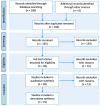Psychological Health and Physical Activity Levels during the COVID-19 Pandemic: A Systematic Review
- PMID: 33334073
- PMCID: PMC7765528
- DOI: 10.3390/ijerph17249419
Psychological Health and Physical Activity Levels during the COVID-19 Pandemic: A Systematic Review
Abstract
The coronavirus disease (COVID-19) pandemic has been devastating in all senses, particularly psychologically. Physical activity (PA) is known to aid psychological well-being, and it is worth investigating whether PA has been a coping strategy during this pandemic. The objective of this literature review is to analyze the extent to which engaging in PA during the COVID-19 pandemic impacts psychological health in the adult population. The literature was searched in all databases from the EBSCOhost Research Database-MEDLINE, APA PsycArticles, between others-published between 1 January 2019 and 15 July 2020. From 180 articles found, 15 were eligible. The reviewed articles showed an association between mental health distress-e.g., stress, anxiety, depressive symptoms, social isolation, psychological distress-and PA. This research concludes that the COVID-19 pandemic and the lockdown measures caused psychological distress. Those studies that analyzed PA showed that, during quarantine, adults increased their sedentary time and reduced their PA levels, showing controversial psychological outcomes. This review discusses whether PA is an effective strategy to face the COVID-19 pandemic psychological effects contributing to a further putative increase in the prevalence of psychiatric disorders.
Keywords: COVID-19; coronavirus; lockdown; mental health; pandemic; physical activity; psychological distress.
Conflict of interest statement
The authors declare no conflict of interest.
Figures
References
-
- World Health Organization Considerations in Adjusting Public Health and Social Measures in the Context of COVID-19: Interim Guidance. [(accessed on 20 August 2020)]; Available online: https://www.who.int/publications/i/item/considerations-in-adjusting-publ....
-
- World Health Organization . Síndrome Inflamatorio Multisistémico En Niños y Adolescentes Con COVID-19. World Health Organization; Geneva, Switzerlands: 2020. pp. 1–3.


